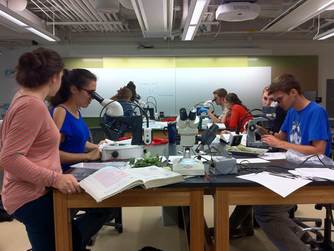
Experimental Design and Analysis for Biologists (BIOL 418). This course is a key part of both the undergraduate and graduate curriculum in the department and is also a core requirement of the Environmental Biology major. Through this course, I strive to help students understand the critical importance of appropriate experimental design and methods of data analysis when testing hypotheses in environmental biology. The course is oriented around hands-on field and laboratory experiences in experimental design, data collection, data analysis techniques, null model formulation and hypothesis testing. Students design, conduct, analyze and present (in oral and written forms) the results of field and greenhouse experiments.
Foundations of Biology (BIOL 104). This is an introductory biology course for biology majors and pre-medical students. Through both lecture and lab, students are introduced to a range of topics, beginning with a detailed look at evolution, the central unifying theme of biology. In the second section of the course, students survey the extraordinary diversity of organisms that evolution has produced. In the third section of the course, students explore the science of ecology, and examine how organisms interact with one another and with their environment. The final section of the course examines the increasingly disruptive human impacts on the biosphere, and ways to limit or mitigate these effects. In this course, I strive to introduce students to the primary literature, learn how to generate and interpret scientific data, and appreciate that scientific understanding is a continuously evolving process.
Global Climate Change Ecology (BIOL 268). Over the past century, the mean surface temperature of our planet has increased slightly less than 1°C. While this may seem like a small increment, global warming is already profoundly affecting Earth’s organisms and ecological communities. In this class, we will explore the causes and biological consequences of climate change on Earth. Through lectures, discussion, critical reading of the literature, and examination of long-term data sets, students will gain an understanding of: how Earth’s climate system functions, how past climatic fluctuations compare to projected future changes, how human activities contribute to climate change, and how climate change affects organisms, communities, and ecosystems. Additionally, we will explore the direct effects of climate change on disease risk for human and other animal populations. Lastly, we will consider what changes would need to occur to stabilize or reverse current trends. We welcome lively discussion and debate that will further our understanding of the impacts of climate change on Earth’s living resources.
Biodiversity: Genes to Ecosystems (BIOL 448). Earth's biota is currently experiencing a sixth mass extinction event that is largely due to human activities. However, understanding the factors that structure biodiversity has proven an exceptionally difficult task since these factors change dramatically across space and time. In this course, we explore classic and current theory in community ecology, with an emphasis on the roles of molecular biology and evolutionary theory in shaping community ecology and helping ecologists make sense out of chaos. Additionally, because biodiversity can in turn impact ecosystem function, we examine the interplay between community and ecosystem dynamics to determine how species interactions and community structure may alter critical ecosystem properties. This course consists entirely of primary literature, and students are required to actively lead and participate in discussions. Scientific writing is also a key part of this course. At the end of each unit, I present students with data from an unidentified paper, and students practice writing an introduction section to a manuscript for these data using the literature we have reviewed in class. They are then asked to interpret these findings in light of the published literature in the discussion section of this paper. Additionally, students take a deep-dive into a topic of their choice via the term paper for the class.
Global Climate Change Ecology (BIOL 268). Over the past century, the mean surface temperature of our planet has increased slightly less than 1°C. While this may seem like a small increment, global warming is already profoundly affecting Earth’s organisms and ecological communities. In this class, we will explore the causes and biological consequences of climate change on Earth. Through lectures, discussion, critical reading of the literature, and examination of long-term data sets, students will gain an understanding of: how Earth’s climate system functions, how past climatic fluctuations compare to projected future changes, how human activities contribute to climate change, and how climate change affects organisms, communities, and ecosystems. Additionally, we will explore the direct effects of climate change on disease risk for human and other animal populations. Lastly, we will consider what changes would need to occur to stabilize or reverse current trends. We welcome lively discussion and debate that will further our understanding of the impacts of climate change on Earth’s living resources.
Biodiversity: Genes to Ecosystems (BIOL 448). Earth's biota is currently experiencing a sixth mass extinction event that is largely due to human activities. However, understanding the factors that structure biodiversity has proven an exceptionally difficult task since these factors change dramatically across space and time. In this course, we explore classic and current theory in community ecology, with an emphasis on the roles of molecular biology and evolutionary theory in shaping community ecology and helping ecologists make sense out of chaos. Additionally, because biodiversity can in turn impact ecosystem function, we examine the interplay between community and ecosystem dynamics to determine how species interactions and community structure may alter critical ecosystem properties. This course consists entirely of primary literature, and students are required to actively lead and participate in discussions. Scientific writing is also a key part of this course. At the end of each unit, I present students with data from an unidentified paper, and students practice writing an introduction section to a manuscript for these data using the literature we have reviewed in class. They are then asked to interpret these findings in light of the published literature in the discussion section of this paper. Additionally, students take a deep-dive into a topic of their choice via the term paper for the class.
Research Intensive Senior Experience - RISE (BIOL 341/342). The Biology Department encourages students to pursue scientific and pedagogical research in collaboration with faculty members so that they may learn the joy and frustration of research through hands-on experiences. I have mentored undergraduate students that pursued both RISE options: 1) Laboratory research: students develop an original research project including experimental design, execution and data analysis. 2) Teaching biology: students perform original pedagogical research while conducting supervised teaching in D.C. public high schools.
Ecology, Evolution and Behavior Journal Club (BIOL 514). EEB Journal Club provides an environment for graduate students to present manuscript drafts, proposals they would like to submit, or a journal article of their choosing to an audience of peers and professors. They are able to receive helpful feedback that has resulted in many published papers and funded grants, and the journal club also serves as practice grounds for speaking to a scientific audience.
